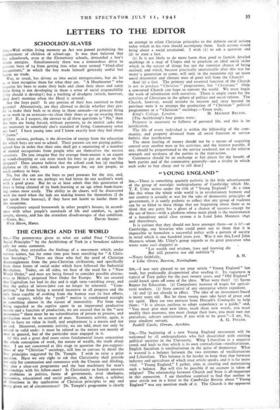LETTERS TO THE EDITOR
SCHOOLBOY-SLAVES
sut,—Well within living memory an Act was passed prohibiting the employment of children of school-age. It was then believed that his schoolwork, even at the Elementary schools, demanded a boy's whole energies. Simultaneously there was a tremendous drive to prevent boys of 14 from getting into what were termed "blind-alley occupations," in which the boy made himself generally useful but learnt no trade.
War, as usual, has driven us into social retrogressions, but do let us at least recognise them for what, they are. "A Headmaster" who requires his boys to make their beds and clean their shoes and carry their firing is not developing in them a sense of social responsibility (why should it develop?) but a loathing of drudgery (which, however, they don't mention when the Head is around).
Are the boys paid? Is any portion of their fees remitted to their parents? Alternatively, are they allowed to decide whether they pre- fer to make their beds or to. sleep in them unmade—to procure firing or to work in an overcoat—to clean their shoes or go on wearing them dirty? If, as I suspect, the answer to all these questions is "No," then the boys are being forced, without payment, to do menial :asks that are necessary to somebody else's standard of living. Community sense my foot! I have young sons and I know exactly how they feel about "chores." _
More serious, perhaps, is the diversion of energy from the education for which boys are sent to school. Their parents are not paying public- school fees in order that their sons shall get a smattering of a number of menial occupations from people who are themselves the merest amateurs. Do you imagine that the average form-master is an expert at wood-chopping or can even teach his boys to put an edge on the chopper? Does anyone believe that the school cook has (a) teaching diploma or (b) time, .with meals to prepare for, say 200 people, to teach cookery to boys.
No, but she can use the boys to peel potatoes for the 200, and, since there is a war on, perhaps we had better do our scullion's work with a good grace. But let us at least admit that this generation of boys is being cheated of its book-learning at an age when book-learn- ing comes most easily. The ability to do chores will be discovered with the need when the lads are making homes for themselves (I do not speak from hearsay), if they have not learnt to loathe them in the meantime.
Compulsory unpaid housework in other people's houses, in accord- ance with other people's standards of life and comfort, is, quite simply, slavery, and has the attendant disadvantages of that condition.
West Meon, Hants.


























 Previous page
Previous page